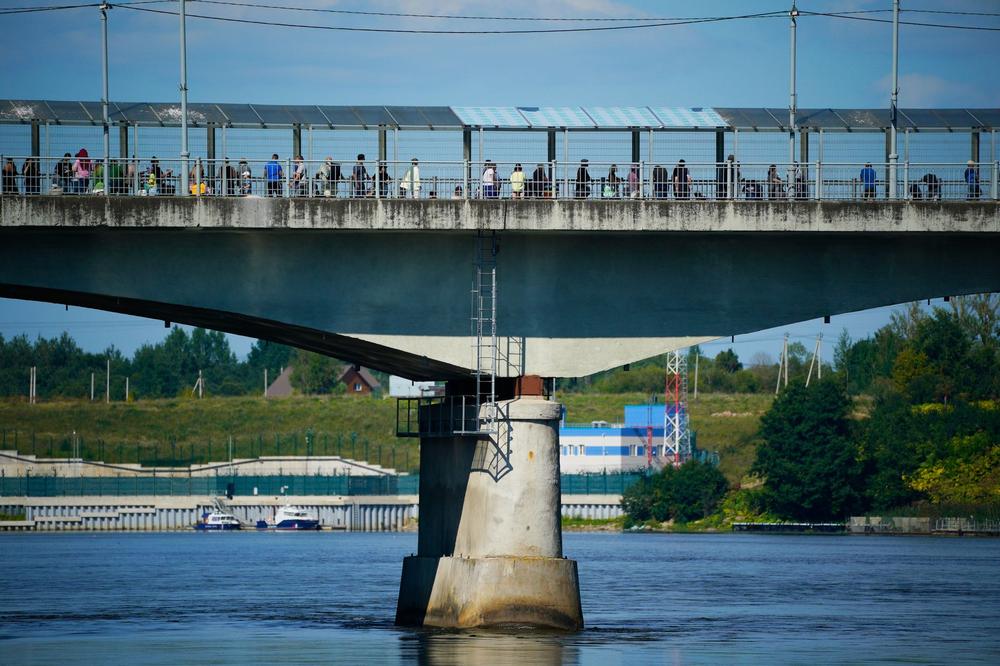NARVA, Estonia — On both sides of the Narva River, fishermen stand knee-deep in the water between two medieval castles just 101 meters apart. Above them, the flags mark where NATO ends and Russia begins.
For years, experts have been warning of the so-called "Narva scenario" — a plan in which Russia might attempt to grab an Estonian border city using its old tune, "protecting the Russian-speaking population."
Following Europe's inability to handle Russia's now recurring drone incursions, the mostly-Russian-speaking city of Narva is once again a sticking point in NATO's eastern flank's defense.
When asked about Russia, located in plain sight across the shallow river, and its appetite for war, Narva residents have been reserved in their responses.
"Anything is possible these days, but I'm not scared," a man on the embankment said in response to a question about a potential invasion.
A taxi driver, moments later, was far more skeptical of war. "You used to have to halve the magnitude of whatever they say in the media, even before the war. Now you can believe only 1% of it."
Narva is the third-largest city in Estonia. Located closer to Russia's St. Petersburg than to the Estonian capital of Tallinn, it is home to roughly 54,000 inhabitants, 95% of whom are Russian-speaking, according to the 2021 census.
The proximity to the border and the overwhelming domination of the Russian-speaking population make the city of Narva a target of increased attention as NATO-Russian relations go south.
Despite disputes within the alliance, those in Narva who spoke with the Kyiv Independent have all asserted that a Russian attack isn't something they expect.
Nearly a quarter of the Estonian population believes that being part of NATO will deter any aggression, and almost half believe that direct military assistance would be provided should the war occur.
"Narva is not next, because we are prepared," said Major Neeme Brus, spokesperson for the Estonian Defense League or Kaitseliit, the country's voluntary territorial defense organization.
A complicated relationship
Relations between Russia and the Baltic states, which have seen a nearly 50-year-long Soviet occupation in the past, have never been easy. The countries' revival has gone hand in hand with the Kremlin's attempt to undermine their resolve.
A large Russian-speaking population, which accounts for a quarter of Estonia's total, has been at the forefront of these efforts.
Before the all-out war, a sticking point in the relationship between Moscow and Tallinn was Estonia's moves to clear itself from Soviet presence, such as statues and monuments, moving them out of public spaces and into museums and commemorative sites.
Many Russian-speakers in Estonia have disagreed with these decisions.
"The symbols of the past war do not constitute the support of the current war; the state assigned this meaning to it," says Oleg Kultaev on air during a Russian-speaking program on Estonia's public broadcaster ERR. On air, he dodges the matter of the current war in favor of criticizing the country's domestic affairs.
The activist used to organize the "Immortal Regiment," the commemoration parade initiated in Russia as a civil initiative in honor of the fallen soldiers of WWII, later hijacked by the Kremlin as part of its propaganda.
Now, Kultaev is running in the municipal election set for October, the last campaign in which non-citizens can vote — one of the changes being rolled out in Estonia.
The country's non-citizens are a group of local residents who moved to Estonia during the Soviet Union occupation and declined or failed to pass a mandatory citizenship test, which includes questions on the country's history and language.
Kultaev initially agreed to speak to the Kyiv Independent on the condition that he'd also be recording the conversation, but later changed his mind.
Politician Mihhail Stalnuhhin, voices similar criticism of Estonian policies on his YouTube channel, but does it with a disclaimer: "We're just talking here, this is not a call to action, just our opinions."
Estonia has revoked residence permits and handed down sentences to those found guilty of collaborating with Russia's secret service, FSB, Kremlin-affiliated organizations, such as Rossotrudnichestvo, and funding NGOs operating in the Russian-occupied parts of Ukraine.
There have been no known cases of deportation merely for posting online.
Another major point of confrontation between the Estonian and Russian-speaking activists concerns the country's education system, where the Estonian language has become the sole language. In Narva, over 40 teachers lost their jobs because their Estonian language skills were deemed insufficient.
"'Go back to Russia,' I'm constantly being told online," Anna, a student of Narva College, said in conversation. "But where should I go? I've only been there once. Estonia is my country."
Anna is seeking to become a preschool teacher. For her, the graduation is delayed for one year — she has to pass the language proficiency exam. She holds Estonian citizenship, but argues that it's hard to become proficient in Estonian while living in a mostly Russian-speaking region.
"We respect Estonia, its traditions, and language. But the actions of our politicians, how they shut down Russian-speaking education (…) often offend us. We're citizens of Estonia; we were born here, and we hold Estonian passports."
Russian propaganda is preying on issues, often calling out Tallinn's policies as "russophobic."
The Friendship Bridge over an unfriendly border
Russian provocations have intensified over the past few years.
In 2024, Russia launched balloons equipped with radar and video surveillance systems. In September, Russian fighter jets crossed over into NATO airspace and spent around 12 minutes not responding to ground requests.
"The border situation is stable, but we are tested constantly," says Veiko Kommusaar, deputy director general of Estonia's Border Guard.
Last summer, Russian border guards snatched navigation buoys in the fairway of the Narva River. After a year of negotiation attempts, it became clear that Russia had no interest in resolving the issue; on the contrary, they would like to create more grey zones.
GPS jamming and signal spoofing are also frequent in the region, sometimes disruptive to commercial aviation and search and rescue operations in local forests.
Advice heard often when entering Narva is to disable the automatic network selection on one's phone. "Before you know it, you're connected to a Russian service provider," locals have said.
Estonia responds to these provocations with new radar and surveillance systems, as well as thorough border checks. Around 60 million euros were committed to anti-mobility installations and bunkers with the Baltic Defense Line.
While neighboring Finland sealed its border with Russia completely, the Friendship Bridge linking Narva to Russia's Ivangorod became the prime route for travel to Russia.
"Collaborators don't live long."
Like in any border city, many in Narva still maintain ties with relatives and friends across the border or simply travel to buy cheaper goods. Yet in late September, the bridge had only a small line leading to it.
The bridge, now upgraded with chain-linked Dragon's Teeth and barbed wire in light of Russia's full-scale invasion of Ukraine, is only open during the day, and solely for pedestrians.
Four Russian ladies in their fifties have made their way from Russia to Estonia. They live in Finland and are outspokenly irritated about the 23-hour detour through Estonia that they now have to make and the conditions at the checkpoint. In July, they say, travellers had to sleep on the benches to secure their places in the queue.
Estonian border guards remain firm — a lot has to improve in Russia's policies before the restrictive measures can be lifted.
"We have had our key message for a long time that nobody should go to Russia these days. It is, of course, their right to do so, but we will not make their life any easier," Kommusaar says.
The ladies at the checkpoint were irritated by questions about a threat from Russia. "Russia has better things to do than attacking Estonia, it's building its economy," they said, echoing Russian propaganda. The invasion of Ukraine happened because locals had "asked" Russia for protection.
"And we are not asking for it."
Those in the middle
Back in 2022, refugees from Ukraine arrived through the Friendship Bridge running from Russian-occupied territories. Oleksandr from Kherson was one of them. The reason for staying in Narva was his wife's family ties to the area.
"My relatives here welcomed us at the beginning and helped us with things, such as food. But then, when the conversation got going at some celebration, one of them loosened up and started saying that Narva is Russian. A normal person cannot comprehend this. And this is because they watch Russian television," Oleksandr recalls, adding that their conversation and relationship with the relative did not last long.
The conversation with Oleksandr takes place in a Ukrainian community center, a room filled with artifacts and flags signed by Ukrainian fighters. Down the long, dark corridor adorned with a mural depicting the two castles across the Narva River, the door to the Ukrainian community sits right next to a picture of the castle on Russia's side of the border.
"They don't understand that the local Russians are Estonians to them, who will be killed just as it was in our cities. Collaborators don't live long," Oleksandr said.
Russian state TV channels and propagandist websites were officially banned in Estonia. The broadcast signal, however, can be revived with a simple antenna. The Narva city newspaper continues to publish a TV schedule for the banned Russia 1 and NTV channels.
The support the Ukrainian community receives from Estonia adds to the tensions among Russians, although it rarely manifests in public.
Russians express their annoyance with Estonian authorities and Ukrainian presence in closed Telegram chats and Facebook groups, says Irina Lobanova, the head of the Ukrainian community in Narva. An ethnic Ukrainian, she has lived in Narva for years, holds Estonian citizenship, and speaks Estonian.
Battle for people's minds
The local population remains deeply divided when dealing with the local identity. Russian propaganda snowballing from across the border is also having its toll.
"People live in this mythology that Russia never invaded or started a war. It was nurtured throughout decades," says Maria Smorzhevskikh-Smirnova, the director of the Narva Museum. "For us, it is also a battle for Narva, because the influence from the other side through the information space can be compared to an onslaught, a very aggressive wave."
When Russia celebrates Victory in World War II, on May 9, hosting a concert praising its war in Ukraine, the stage is turned to face Narva.
Meanwhile, the Narva museum overlooking the stage couldn’t stay silent. A decision to hang a poster comparing Russian President Vladimir Putin to Adolf Hitler on the museum wall facing the Russian side was an impromptu gesture, Smorzhevskikh-Smirnova says, but this small gesture managed to "spoil the picture" for Russian TV channels and rile up the local community.
Smorzhevskikh-Smirnova spoke with the Kyiv Independent in Tallinn, a day after Russia sentenced her, an Estonian citizen, to 10 years in absentia for "rehabilitating nazism." Some in Narva wished this were a real prison term. Others thanked her for expressing the anti-war stance on behalf of the community.
The fight for the younger generation goes on beyond schools, in Narva's branch of the Estonian Defense League, Kaitseliit. The civilian volunteer organization under Estonia's defense ministry boasts 22,000 members, which spikes after every new aggressive move from Russia.
Putin is the organization's best salesman, Major Brus, the Kaitseliit spokesperson, jokes.
Kaitseliit’s youth groups — Young Eagles and Home Daughters — focus on sports, orienteering, and survival skills — community-building activities that are not directly related to the military.
"Twenty-somethings understand that it's better to live in Estonia, have a European passport, and study in Europe. Some of them have become Estonian citizens and even joined the Kaitseliit," said Roger Vinni, Kaitseliit press officer in Narva.
In his 15 years with the organization, he has seen Russian speakers growing up with Kaitseliit and joining the police or emergency services.
Smorzhevskikh-Smirnova believes that the museum's mission is to uphold the border in a way for all residents.
"(We have) to clearly understand the methods Russia uses, it presents a historical picture in a way to say that there are no borders. And we must assert these boundaries clearly. It is our museum's mission to remind everyone that Europe starts here."

 “Suspect it’s coming from crazy haters”: Hasan Piker denies using a shock collar on his dog after her livestream yelp
“Suspect it’s coming from crazy haters”: Hasan Piker denies using a shock collar on his dog after her livestream yelp